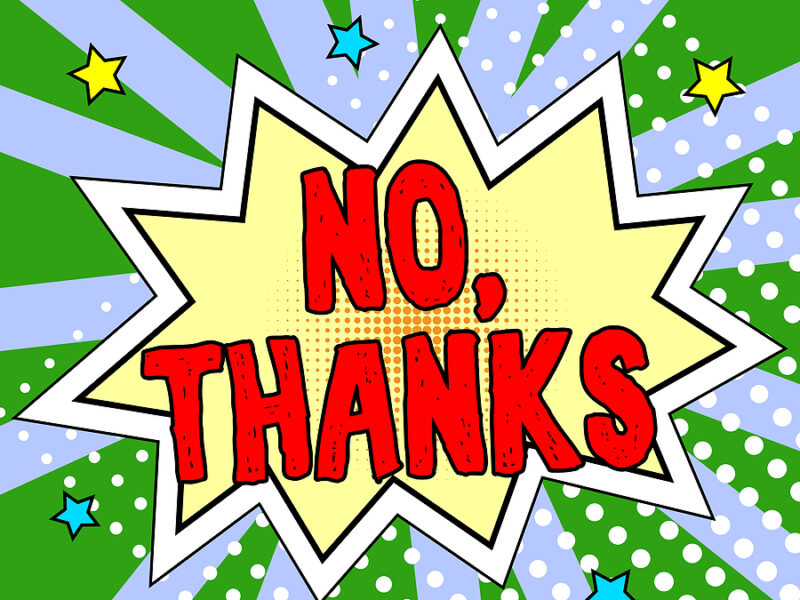With all the discussion about marketing platforms, some authors think the only thing standing in the way of being published successfully is the lack of a large-enough, personal promotional machine.
It is important, along with several other items affecting whether a book is published by a traditional publisher; but there is one powerful item that is rarely discussed or mentioned.
Sometimes books are rejected by publishers because an acquiring editor disagrees with your book’s premise and/or application.
Similarly, some books are rejected by agents because they disagree with your book’s premise and/or application.
I hope this isn’t a surprise to you, but every Christian does not see everything the same way as every other Christian. Pick a theological topic out of a hat, and I can guarantee you there are multiple viewpoints from those who consider themselves Christians.
Long ago I had a person ask me if I embraced an Arminian theological point of view or a biblical point of view. I think I changed the subject rather than respond.
Sometimes when you unpack a passage of Scripture in your writing, a reviewing editor or agent might see significant errors in your thinking.
Sometimes when you explain how to live more effectively as a Christian, it might be flagged as an incorrect application of Scripture.
With all the discussion of artificial intelligence in publishing during the last year, it might give the impression humans are no longer involved in the publishing process. But humans still review everything, and sometimes they disagree with the way you handled a certain passage of Scripture or life subject.
There are reasons for this.
Many editors and agents who evaluate and acquire books in the Christian publishing market have substantial theological training. Many have master’s or doctoral degrees in theology. Your Bible study is going toe-to-toe with someone who knows Hebrew and Greek exegesis quite well. Many are former pastors or served in leadership positions in a church.
Editors have differing opinions on church leadership, biblical training, and theology, not to mention the Bible in general, which can itself be polarizing, depending on many factors.
If your book is rejected for publication, it is rejected by people, not a company. Sure, they work for a company; but decisions are made by people, and they might not see things the same way as you.
One of the more difficult issues with theological knowledge is that the Bible is understandable to a person even if they don’t have an MDiv. That person/author can teach it accurately, be an encouragement to fellow believers, and open the eyes of someone who hasn’t understood to this point.
But books are evaluated by editors and readers who have a wide spectrum of experiences and training. In general, they like books from authors with formal education in the field.
Knowing your publishing “cloud of witnesses” can be critical at times–complicating things for the writer–is wise.
I apologize for not offering a solution. But as a person who doesn’t like surprises, knowledge of the process should alleviate some of the anxiety when someone jumps from behind the curtain to criticize your work.



 H Is for Hybrid
H Is for Hybrid

Rejection’s not a problem
(to live is Christ, to die is gain),
just a drop in life’s great ‘oggin
(we are alive, and we remain).
Rejection isn’t this world’s end
(be humble and contrite, find favour),
but it hurts, so don’t pretend
(in Christ there’s rest for weary labour).
Rejection doesn’t mean you’ve lost
(some will revile you for My sake),
but steadfastness has a cost
(life’s crown is yours when you don’t break),
so write on with a joyous heart
of love for Him…take Mary’s part!
This is so spot on, Dan, and very wise. Frankly, we need to thank God for the role of editors and agents. They serve as one of the more important lines of defense the Church has against the dissemination of heresy, error, and bad thinking/advice. Imagine a world without any filters, in which everyone was free to just spout their own opinion, no matter how wrong, misinformed, or toxic it might be. I mean, we’d exhaust ourselves having to sort through all the falsehoods, half truths, and fake facts there would be! (Oh, that’s right, with the advent of the Internet and the ease of self-publishing, I guess we’re already there. But I’m still grateful for the remaining gatekeepers who are courageous enough to say, “No, we’re not going to publish that!”)
So wise you are, Dan Balow.
I’ve been able to see rejections as God telling me that was not the publishing house for me. I’m disappointed, sure, but I think I only was truly upset one time when I was SURE a publishing house wanted a story. They kept it for months. I revised it twice. And when it went to committee, it got rejected.
I know way more now than I did then, so when I get rejections now, I’m not as disappointed. But I do wonder at times why I keep going. haha! It comes down to selling short stories and devotions. They keep me encouraged and going while I wait for the bigger stuff to get picked up.